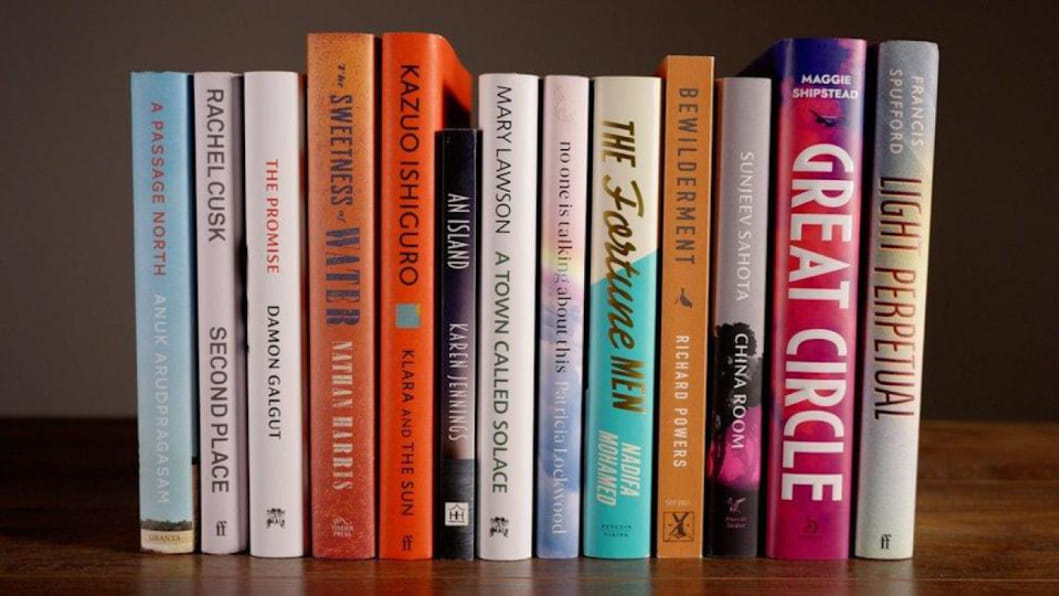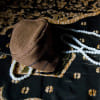Conversations, troubled pasts, and the threat of technology shape the 2021 Booker Prize longlist

This year's Booker Prize longlist, the most prestigious literary award for fiction published in the UK, was released yesterday, with well-loved names such as Kazuo Ishiguro, Rachel Cusk, Patricia Lockwood, and Richard Powers making the cut alongside the critically acclaimed Anuk Arudpragasam, Sunjeev Sahota, Damon Galgut, and others.
The winning title will receive GBP 5,000 and the shortlisted authors, to be announced on September 14, will receive GBP 2,500.
"What we tried to do was hear what the books had to say to us", Maya Jasanoff, Harvard professor and chair of the 2021 judges panel, said at the virtual announcement. "What marks all of these books is a really distinctive voice. We'll find that the voice can vary a lot [...], but there is a kind of deliberate quality and attention to the writing."
The longlist
A Passage North (Granta, 2021), the second novel by Sri Lankan Tamil author Anuk Arudpragasam, whose The Story of a Brief Marriage (Flatiron Books, 2016) previously won the DSC Prize for South Asian Literature, travels, with its protagonist Krishnan, from Colombo to the innermost regions of Northern Sri Lanka, after he receives a message from a long lost love. The journey unspools the legacy of Sri Lanka's 30 year-spanning civil war.
Sheffield-based Sanjeev Sahota has previously authored Ours Are the Streets (Picador, 2011) and The Year of the Runaways (Picador, 2015), having won critical acclaim including a shortlist in the 2015 Man Booker Prize and a position in Granta's Best of Young British Novelists of 2013. His novel, China Room (Viking, 2021), takes place in two time periods—1929 Punjab, where Mehar, a young, rural bride sits with her sister-in-law in the family "china room" trying to guess which of the men in the family is her husband; and 1999 England, from where he travels to the now abandoned and locked up room to come to terms with the trauma of his birth. Following a similar theme of individuals forming a bond across history, Maggie Shipstead's Great Circle (Doubleday, 2021) sees orphan Marian Graves, living in 1920s Montana, aspire for and realising her dream of flying the skies to taste freedom. She disappears; only to resurface—in spirit—as a Hollywood starlet years later feels compelled to play her role in Marian's biopic.

The Fortune Men (Viking, 2021) penned by Nadifa Mohamed—born in Somaliland, author of Black Mamba Boy and The Orchard of Lost Souls, and also one of Granta's Best of Young British Novelists of 2013—follows the trials of Mahmood Mattan, who is wrongfully accused of murdering a shopkeeper in Tiger Bay, Cardiff in 1952. The story is one of Mattan's disenchantment with the justice of the state.
Damon Galgut's The Promise (Chatto & Windus, 2021) tells the story of the Swarts, a white South African family living on a farm near Pretoria, who have for decades broken the promise of providing her own land and house to a Black woman whom they have employed for her entire life. The reader visits the family through a funeral every few decades, a new president and new powers governing the world each time.
Portraying a different kind of race and employer-employee relations is Nathan Harris's The Sweetness of Water (Little, Brown, 2021), in which the newly freed brothers Landry and Prentiss begin working in the farm of their former plantation owner George Walker, who in turn is traumatised by the death of his son in the just-ceased American civil war. As a relationship of trust and respect forms between the three, local communities begin to grow unrestful at the unusual (for the time) social dynamics at Walker's farm.

With intolerance a common theme running across the longlist, South African poet and author Karen Jennings's An Island (Holland House Books, 2021) explores the concepts of who owns land and to what extent can one guard it from others, as protagonist Samuel grapples with the unexpected arrival of a refugee on his solitary island. Rachel Cusk's protagonist in Second Place (Faber, 2021), rather inversely, invites a visitor to her remote coastal home, so that the presence and the conversations of the artist may unlock an experience testing the implications of womanhood, male privilege, and human relationships.
Canadian writer Mary Lawson's A Town Called Solace (Chatto & Windus, 2021) on the contrary, is populated by people—sisters, mothers, daughters, and strangers, all grappling with grief and past mistakes, in a town set in 1972 northern Ontario. And while Francis Spufford, a Fellow of the Royal Society of Literature while teaching at Goldsmiths University, London, writes about 1944 Germany—a rocket unlanded, and five lives frozen in time—Richard Powers Bewilderment (Hutchinson Heinemann) unravels the life of an astrobiologist who tries to deal with the woes of young parenthood by searching for life on another planet.

Kazuo Ishiguro's Klara and the Sun (Faber, 2021), of course, famously portrays the emotional anatomy of an "artificial friend", with its author having won the Booker Prize once before, in 1989, for Remains of the Day. Of the other critically acknowledged longlisters, Patricia Lockwood's No One Is Talking About This (Bloomsbury, 2021) similarly discerns the precarious balance of life on and off social media as it threatens to overtake the life of the protagonist.
For more book-related news and views, follow Daily Star Books on Facebook, Instagram, Twitter, and LinkedIn.

 For all latest news, follow The Daily Star's Google News channel.
For all latest news, follow The Daily Star's Google News channel. 








Comments